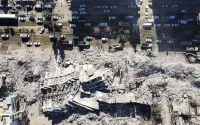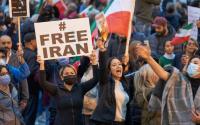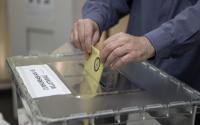The prevailing Palestinian political culture is in an unprecedented state of decay, the most significant manifestations of which are the absence of a national liberation movement, even in form, and the absence of a clear hierarchy and chain-of-command in a Palestinian Authority (PA) under siege by Israeli occupation. Israel has systematically and persistently worked to make the PA drop like an overripe, or perhaps withered, fruit, without its having to expel or murder the PA's symbols or its leader.
However, this does not mean that Israel has dispensed with the need for a Palestinian authority of some sort. On the contrary, it needs such an authority in order to negotiate a permanent, or interim, solution, or at least the Israeli concept of such a solution. Israel thus needs some Palestinian structure to work with; if it had wanted chaos it would have acted in a totally different way. The recent Israeli incursion has specific political aims related to US President George W Bush's recent policy statement and, more importantly, to the Israeli interpretation of that statement. More importantly, because the Israeli interpretation is, in fact, more important than the statement itself.
Sharon's idea of a settlement seeks to steer clear of the final-status issues delineated at Oslo. However, Sharon also knows that he cannot substitute a formula of his own to be imposed on the Palestinians and the Arabs instead of the Oslo solution. This, he realises, cannot be achieved in his lifetime, and therefore he is proposing a long-term interim phase -- longer than the three years mentioned in Bush's speech -- after which negotiations can begin over a permanent solution with a new Palestinian leadership cast in the mold of "the right state and the right men for the right time". This leadership will have accommodated itself to the notion of a provisional Palestinian state on 40 per cent of the West Bank without a single Israeli settlement having to be dismantled.
Who could turn down such a State? Or, more precisely, who would refuse to lead a State of this kind with Washington's blessing? To those whose souls have been defeated it is not the size of the State that counts; rather, it is the American yardstick. Therefore, the leadership of such a State must share Sharon's "realism", fitting itself to the size and shape of the State marked out for them.
In the absence of deterrents and of a strong national liberation movement, the current Israeli blockade of the Arafat-led PA will ensure that the PA will shrivel under the lashes of "realists" who heap scorn on anyone who speaks of the morality of the situation, of ethics or of any principle they brand as naïve. These "realists" have succeeded in prostituting everything, and they deride everything except pragmatism, which at this stage means being governed by a single law summed up as "agree to everything that Washington says".
The most fundamental aspect of the moral crisis in Palestinian politics is that the arena of national liberation struggle and resistance has been left open to those who, with the closure of all avenues of hope, have lost any sense of the meaning of life and seek instead a meaning in death. The most visible face of this absence of moral compass, as well as of a national enterprise and strategy for resistance, is that young people are going out to blow themselves up, instead of living and experiencing life, in order to make the Israelis "pay the price", regardless of the political consequences.
The other face of Palestinian decay is the way in which the current power struggle is being conducted under the occupation, and the prim way people talk about taking positions in an indeterminately provisional Palestinian State cut out of the fabric of Sharon's imagination and adopted by Bush. Thus, while these people vy over their personal positions, instead of resisting the occupation, and impart advice to Washington, which is ever eager to enter into consultations over the most productive means for "reform", others are blowing themselves up in expressions of anger such as history has seldom seen.
Under such conditions, it is not sufficient to sign petitions protesting against these suicide operations when the only alternative open to the Palestinians is to welcome Bush's proposals and participate in "reforms" the fruits of which will be picked by people who are themselves beyond reform.
Things have now reached the point where one individual who once denounced people in Arafat's circle for voicing contrary opinions, or for vying with him for Arafat's good graces, is now quarrelling with Arafat in order to play up to the US or Israel. However, just as interesting are the staunch defenders of Arafat against any Arabs, or especially any Palestinians, daring to criticise him on the grounds that effrontery of this sort is nothing but a bid to steal the limelight from the leader.
Today, we see some of these Arafat cronies criticising Bush's speech because it has "forced" them to stand by the Palestinian president. They speak as if up to now they had spent their entire lives taking issue with Arafat, instead of which they have actually made ingratiating themselves to Arafat a lifetime's career occupying their every waking hour. Notice, too, the use of the word "forced". What it means is that while these people pose as Arafat's defenders, in fact they are saying, "I'm ready to conspire against him, but am forced to defend him," reproaching Washington in public and Israel, or at least the Israeli Labour Party, in private for putting them in such an awkward position.
We should not be lenient in our judgment of the opportunism that has infected the leaders of the PA. These people, who once professed their support for the national liberation struggle, have now abandoned it, along with the political culture that coalesced around it in Lebanon and in the PA after Oslo, in favour of a scramble for position and power bases as the Israeli occupation forges ahead with the latest incursions.
Indeed, the occupying power has placed its faith in a directly proportional relationship between the severity of its blockade of the PA, on the one hand, and the rise of political opportunism and the rush to self-serving solutions to the question of leadership, on the other. It appears to have hedged its bets in the absence of a strategy for a Palestinian national liberation movement that could check the decay and establish criteria for leadership based on the ability to lead the struggle in its various political and organisational dimensions.
We should not be lenient in our judgment because this opportunism is not just a manifestation of the attrition that has overcome the national liberation movement and the rise of parasitism. Rather, it is symptomatic of the demise of this movement before it has achieved its national objectives, a demise, moreover, that has taken the form of a moral degeneration reminiscent of the decadence that accompanied the collapse of empires, with the exception that here we are not talking about an empire, or even about a state, but rather about a lumpish entity under military occupation.
It is not sufficient for critics of this situation to point to individuals or to come out with unworkable contrivances for "ending the impasse", such as "Arafat must come out and declare such and such", or "Arafat must call for elections". Nor should anyone take comfort in the meetings between Peres -- with Sharon's go-ahead -- and Palestinian ministers. Sharon does not care who Peres meets with, as long as it isn't Arafat, of course. He only cares about what is talked about in these meetings, acceptable subjects including supplies, medicine, food and travel passes, along with "ministries", the Palestinian sobriquets for these issues.
After all, these ministries, since they are operating under occupation, are in effect just forms of municipal government forced to coordinate with the "Israeli side" -- today's euphemism for the occupation forces. What matters to Sharon is that all contacts between the Palestinians and the Israelis stay as clear as possible of politics until negotiations begin over a Palestinian state tailoured to Israel's conditions. It seems that Sharon and Washington are determined to inflict God's curse on Moses upon Arafat, condemning him to lead his people in the desert for forty years without ever being able to cross over into Canaan and the promised land.
However, criticising the current state of collapse must extend beyond reproach and faultfinding. It is not a reform of the "reform process" that is needed, but rather a strategy for resistance and for creating the institutions needed for that end. It is to be doubted whether this is possible by changing the PA's job description, or by enlisting its employees to in-house training courses to provide them with struggle-against- occupation skills. There will always be a need for effective institutions to tend to the daily affairs of the people, and these institutions are in no doubt in need of reform. However, remedying the current Palestinian crisis needs something more: it needs the reconstruction of the Palestinian resistance movement as a movement resolutely set against Israeli colonialist apartheid and the blatant separatism and racism it embodies.
This task, in turn, requires a democratic political mindset as far removed as possible from the solipsistic opportunistic mindset that currently prevails within Palestinian political institutions and that awaits the salvation that international, and specifically, American, moves allegedly will bring. This latter mindset has nothing to do with any form of national struggle or resistance, in spite of the fact that such national struggle and resistance is a realistic option, given that its prerequisites exist in Palestinian society, with its store of courage, dedication and expertise and with its proven daily willingness to fight and sacrifice.
Meanwhile, in the echelons of the PA leadership the business of waiting for salvation from abroad has reached such absurd heights that the very people Bush targeted in his policy address have welcomed that address as positive. And, the struggle for power within the PA, even under the continuing occupation, has reached a level of absurdity where, no sooner is the curfew lifted than demonstrations take to the street, barely a stone's throw from Israeli tanks, to voice support for, or opposition to, this or that appointment or presidential decree. What is happening in Palestine defies belief, especially in view of the Palestinian people's heroic steadfastness against the Israeli occupation.
Herein lies the precondition for action in the Arab World. It is all well and good to want the people to take to the street to protest, but first tell us what your platform for the struggle is. People will not fight if they do not have hope and a horizon to look towards. At the same time, it is impossible to regulate the official Arab stance if the Palestinians are not clear about what they want themselves, or are obsessed, as are many Arab regimes, with concocting pretexts for accommodating themselves to what Bush said in his recent speech.






